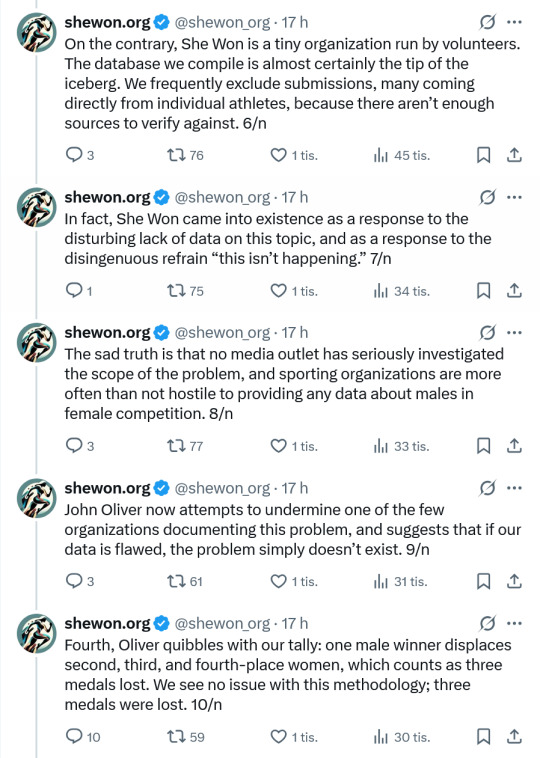like-a-ruby
2K posts
There is a coherence in things, a stability; something is immune from change and shines out in the face of the flowing, the fleeting, the spectral, like a ruby. –Virginia Woolf, To the Lighthouse
Don't wanna be here? Send us removal request.
Photo

Consent can be revoked at ANY time for ANY reason. The rules don’t suddenly change for you just because you’re part of a minority.
I like this guy’s response though

3K notes
·
View notes
Text
I hate how saying “non men loving non men” applies only to lesbians, you never see anyone say “non women loving non women” when talking about gay men.
274 notes
·
View notes
Photo


金陵女子大学 Jinling Women’s College’s dance on May 29, 1948 in Nanjing. Also known as Ginling College, it was started in 1915 and was the first institution in China to grant bachelor’s degrees to female students.
Sources: Fotoe- 1, 2, 新浪图片, www.image-china.com.cn
8K notes
·
View notes
Text
Gender non conforming kids do not need fixed. Not by conservatives telling them they should fit the gender role society attached to their sex. And not by liberals telling them they need to go on puberty blockers so they can transition to the other gender/sex. Literally just leave them alone
894 notes
·
View notes
Text

I think I posted a few months back about how Iceland's government coalition was going to be headed by 3 women but in today's news, it was reported that all major positions in Iceland are held by women.
The positions are:
-The heads of all 3 political parties in the central government
-The heads of all parties that form the Reykjavík local government
-The President of Iceland
-The head of the police
-The head of the church of Iceland
-The Dean of every university in Iceland
-The head prosecutor of Iceland
The cabinet of the central government is also primarily female, if I recall correctly.
The head of the biggest bank in Iceland, Íslandsbanki, is also a woman.
Go on Iceland, become a matriarchal society. You know you want to.
791 notes
·
View notes
Text
Do feel like "what if you're on the wrong side of history" has become the leftist version of "what if you go to hell" like. Ok. What if.
413 notes
·
View notes
Text
I wish that people who identify as nonbinary could just admit that it’s a subculture. They have more in common with emos and goths than with homosexuals and bisexuals…they aren’t experiencing oppression for the way they were born, at worst they’re experiencing bullying for the way they choose to express themselves. So why are we supposed to consider them Super Special And Oppressed Queers when they just aren’t? They need to just leave LGB people alone and embrace the fact that they are an aesthetic-based subculture, not an oppressed minority.
1K notes
·
View notes
Text
I wish there existed a party that actually was unapologetically on women's side and on women's side only. A party that would be critical of Islam, sex industry and gender ideology, but valued education, universal healthcare, wanted harsher punishments for rapists and empower abused and underprivileged women both nationally and internationally.
But if such party existed, the left would call them far-right, and the right would call them far-left and they would be banned in seconds.
276 notes
·
View notes
Text
genuinely and honestly think your feminism is useless if you’re lesbophobic.
205 notes
·
View notes
Text

If you put down the wrong sex for someone else or yourself, it is by definition fraud ffs. They’re not saying you can’t be trans, they’re saying you can’t lie about your sex
167 notes
·
View notes
Text

~ Vivian Gornick in introduction to Valerie's Solanas "Scum Manifesto"
996 notes
·
View notes
Text
Every 5 minutes patriarchy goes 'but what else can we take away from women while still keeping them complacent and obedient' and they chip away testing how far it takes until we are openly enraged and ready to fight. Then they give us one thing, or just promise to give it, ask us to be grateful we got it & keep chipping away
434 notes
·
View notes
Text
Sexual orientation is determined by two key elements
1) What sex you are.
2) What sex(es) you’re attracted to.
It is utterly unsurprising that after attempts to change the latter have been made to widespread failure, society would turn our eyes to the former. That does not mean it’s any more possible.
447 notes
·
View notes









